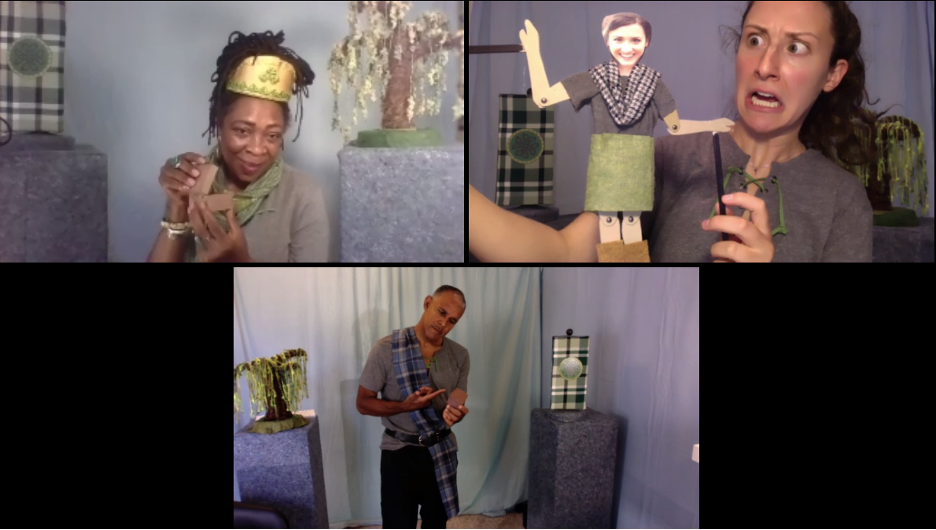Pittsburgh Shakespeare in the Parks turns the virtually impossible into the virtually possible


Pittsburgh Shakespeare in the Park livestreamed a “Cymbeline” performance on Friday evening.
The curtain rises on a late Friday night in Pittsburgh, and the actors get in their position to portray with renewed vigor a Shakesperian tale of mystery and intrigue that, for two hours, transports the audience from their current time into a powerful family drama centered in ancient Britain, Rome and Wales.
While such a production is typical for Pittsburgh Shakespeare in the Parks, which has organized free performances of Shakespeare’s plays since 2005, last Friday’s performance of “Cymbeline” was different from any the company had put on before. While drama, suspense and tragedy shined through on Friday as in other performances, there was one fundamental difference — PSIP conducted its first ever show with each actor delivering their lines in separate rooms, and streamed it on YouTube.
“Cymbeline” follows Imogen, whose father, Cymbeline, is the king of Britain. Imogen upsets her father by marrying a commoner, and in order to escape his wrath, she disguises herself as a man and subsequently joins the Roman army.
The play’s origins were not seamless. When the COVID-19 pandemic set the country in a lockdown in mid-March, PSIP was in a dilemma. Jennifer Tober, founding artistic director of PSIP, said while the company had been planning on performing “Cymbeline” for a long time, the inability to conduct in-person shows put the future of the play in doubt.
She said when the opportunity arose for the performance to move onto a digital platform, not everyone believed it was worth trying to host a production on a virtual stage.
“We had the option not to do the production at all. And there were board members who said, ‘Don’t do it, people aren’t going to like it,’” Tober, who also plays Imogen, said. “But then we also had other people who said, ‘It’s going to be great!’”
After careful consideration, PSIP decided to continue the production, having actors and directors work together to organize a performance over Zoom. But the online platform had its difficulties. Emily Gallagher, the stage manager for “Cymbeline,” said many aspects of her job changed as the performance transitioned to an online setting.
“There were a lot of things I would have been doing as a stage manager that the actors were now responsible for themselves,” Gallagher said. “In an in-person performance, if an actor was missing a prop, it was because I couldn’t find it. Whereas now, if an actor was missing a prop, it was in their home, so I had nothing to do with it.”
These challenges forced PSIP to get creative. Each actor and crew member was forced to adjust their traditional roles to accommodate for limitations of performing in an online space.
While dialogue scenes could be accounted for by utilizing Zoom’s webinar features, it was difficult to translate more action focused sequences into tiny boxes on the screen, according to Jeff Chips, the show’s director. Chips recalled some of the solutions he and his team came up with to help convey the original intent of the story through this new digital medium — including puppets.
“It started with our designer, Lisa Leibering, having this great idea to incorporate the use of puppets,” Chips said. “This allowed us to step outside this kind of Zoom webinar aesthetic and make it very clear we were using something theatrical.”
The puppets were used during scenes in which physical movement was necessary to convey the story to the audience. Actors manipulated the puppets to show different actions on screen, allowing them to present the illusion that each character had a wide, open space to interact with.
Puppets even allowed the production to pre-record large battle scenes, which were impossible to film in person due to safety restrictions.
“Ryan Bergman did all of our video production,” Chips said. “I would individually be on a call with each of our characters and give directions to them, and then they would send their final videos to Ryan, and he was able to cut everything together.”
Along with the new creative measures implemented by the production team, Chips said technological issues created an additional layer of difficulty while conducting the performance, which sometimes popped up in odd ways.
“We had one night of rehearsal where a thunderstorm rolled over the City, and you could kind of track where people were located by when their power went out,” Chips said. “Those are some challenges that would never have occurred during an in-person rehearsal.”
But Tober said the biggest challenge was making sure the same spirit of performance was present even through a virtual setting. She said while the production team could control the making of the sets and the facial expressions of the actors, the audience experience was more difficult to control.
“There is definitely something lost. We’ve gotten the note, ‘Don’t look at the actor on the screen, play to the camera,’ because it’s much clearer to the audience.” Tober said. “But then you’re playing to this black hole and that’s hard because I need that feedback to react.”
While the audience was enjoying the performance, the cast and crew were hard at work making sure everything ran smoothly. During the show, Gallagher was hard at work organizing the performance to make sure the audience members were not limited in their understanding of the show due to the online format.
“I spent most of my time changing the name of the characters [on Zoom], because so many of our actors played multiple characters,” Gallagher said. “I received cues from the stage manager for standby and direction, and so that was an element of live theater that came into play during this online performance.”
At the end of the show, while there was no applause from the audience, dozens of comments came pouring in, congratulating the team on a performance well done.
Tober said at the end of the show, the actors felt caught up in the emotions of the production.
“There is a part at the end where Imogen is reunited with her long-lost brothers and all of us cry every night in front of the camera. And I ask myself, ‘Why? It’s just me in my dining room,’” Tober said. “It was a really nice surprise to find that genuine emotion I had thought wouldn’t be there because of the camera.”
Recent Posts
Marquan Pope: The ultimate shark
One of the most remarkable things about sharks is that an injury doesn’t deter them.…
Who Asked? // Do we really get a summer vacation?
This installment of Who Asked? by staff writer Brynn Murawski mourns the seemingly impossible perfect…
Notes From an Average Girl // Notes from my junior year
In this edition of Notes From an Average Girl, senior staff writer Madeline Milchman reflects…
Meaning at the Movies // The Power of the Movie Theater
In this edition of “Meaning at the Movies,” staff writer Lauren Deaton discusses her love…
EMBRACE sponsors Black Maternal Health Wellness week
Because Black women’s maternal health is not institutionally prioritized, Pitt’s EMBRACE sponsored a Black Maternal…
Local ‘Standing Wave’ coffee truck energizes the Pitt food scene
The small business coffee truck “Standing Wave” has become a beloved new coffee spot on…

